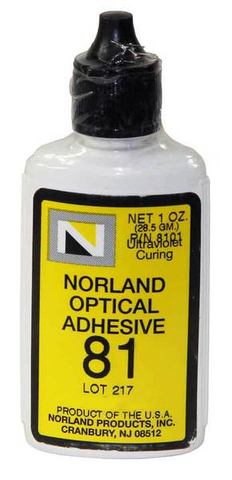Norland 81 UV (Ultraviolet) Adhesive (1 oz. bottle)
Norland Optical Adhesive 81 - UV Adhesive (1 oz. bottle)
>> Download Norland NOA 81 UV Adhesive MSDS Sheet (PDF)
Norland Optical Adhesive 81 ("NOA81") is a single component liquid adhesive that cures in seconds to a tough, hard polymer when exposed to ultraviolet light. It is recommended as an extremely fast and efficient way to precisely bond optical components or fiber optics. It can be cured in a thin layer between two transparent substrates or applied as a drop to form a bridge between two components. Exposure to UV light quickly cures the adhesive and holds the components in place.
The outstanding characteristic of this adhesive is its extremely fast cure. Thin films can be initially set in under 10 seconds and thick films in 20 seconds using the light sources listed below. It is also extremely stable when not exposed to UV light. NOA 81 will not gel up in dispenser tips or cure before you want it to.
NOA 81 is sensitive to the entire range of long wavelength light from 320 to 380 nanometers with peak sensitivity around 365 nm. Cure time is dependent on light intensity and thickness of the drop applied. To fully cure the material requires 2 Joules/sq. cm of energy The adhesive is designed to be cured with small hand held or desktop UV light sources that are easy to use.
| HAND HELD | MANUFACTURER | APPROX. CURE TIME |
| RC-250 |
|
10-60 seconds at 1/2 inch |
| Opticure 4 Light Gun |
|
10-60 seconds at 1/4 inch |
| DESK TOP | MANUFACTURER | APPROX. CURE TIME |
| Portascan 100 |
|
10-60 seconds at 6 inches |
| SB-100P Mercury* Spot Lamp |
|
10-60 seconds at 6 inches |
NOA 81 cures to a hard film but it will not become brittle. It has a small amount of resiliency that provides strain relief from vibrations or temperature extremes. This toughness insures long term performance of the adhesive bond.
NOA 81 cures from the surface down and longer cures are required for thicker films to allow UV light to penetrate to the full depth. After curing, it has very good adhesion to glass, metals, printed circuit boards and other glass filled plastics. This adhesion improves with age with optimum adhesion reached after room temperature aging for one week. This optimum adhesion can be accelerated by aging at 5° C for 12 hours. The cured adhesives can withstand temperatures from -15°C to 12° C.
To remove uncured adhesive from the substrate use an acetone or alcohol moistened cloth. The cured adhesive can be separated by soaking in a chlorinated solvent such as methylene chloride. Normally, the bonded area will separate overnight if only precured. Longer times maybe necessary depending upon the extent of the cure and the size of the bond area.
| Solids | 100% |
| Viscosity at 2° C | 300 cps |
| Refractive Index of Cured Polymer | 1.56 |
| Elongation at Failure | 25% |
| Modulus of Elasticity (psi) | 200,000 |
| Tensile Strength (psi) | 4,000 |
| Hardness - Shore D | 90 |
Shelf life of the liquid is at least 4 months from the date of shipment if stored in a cool (5-2° C), dark place in the original container. If refrigerated, allow the adhesive to come to room temperature prior to use.
Care should be taken in handling this material. The Material Safety Data Sheet should be read for this product as well as for any associated products such as alcohol, acetone or methylene chloride. Prolonged contact with skin should be avoided and affected areas should be thoroughly washed with copious amounts of soap and water. If the adhesive gets into the eyes, flush with water for 15 minutes and seek medical attention. Use the material in a well ventilated area, otherwise a NIOSH approved organic vapor mask is recommended.


